Huddersfield students star at RSC event to boost science teaching
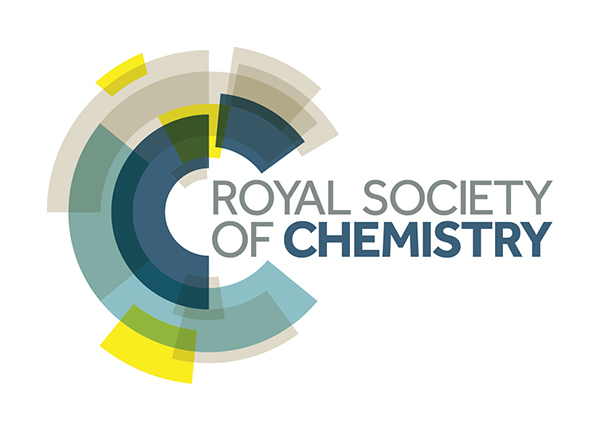
Sat, 27 Jun 2015 08:00:00 BST
Royal Society of Chemistry special event to investigate ways to boost science teaching in schools and HE
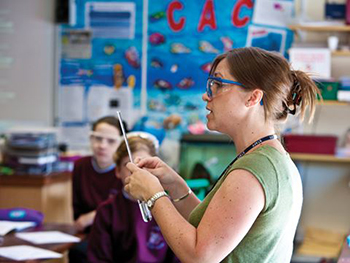 Pictured right is an image courtesy of the Royal Society of Chemistry.
Pictured right is an image courtesy of the Royal Society of Chemistry.
STUDENTS at the University of Huddersfield have been investigating a wide range of ways to boost science teaching in schools and Higher Education. They presented their findings at a special event organised by the Royal Society of Chemistry (RSC).
The Huddersfield students gave presentations and displayed posters outlining research that included strategies to reduce “maths anxiety”; the use of progressive teaching techniques to unlock the potential of young scientists; and how to use crystallography to promote enthusiasm for science subjects among school pupils.
The event was a symposium that took place in York. It was designated a “showcase for student projects on chemical education” and organised by the North East England Regional Education Division of the RSC. Its committee includes the University of Huddersfield’s Professor Rob Brown and Dr Jeremy Hopwood, of the Department of Chemical Sciences, plus School of Applied Sciences academic skills tutor Rukhsana Din.
The symposium had participants from several, mainly northern universities and there were 11 students and staff from Huddersfield. There were four posters from the University and three oral presentations were from Huddersfield students.
Student voice
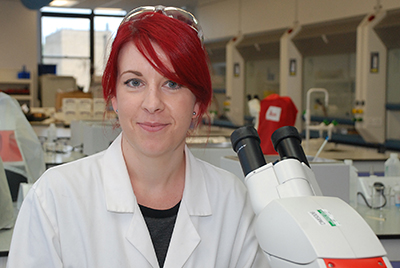 Claire Boakes – “Behave as scientist, then you’ll see yourself as a scientist”
Claire Boakes – “Behave as scientist, then you’ll see yourself as a scientist”
One of the students presenting was Claire Boakes (pictured left), who has just completed her BSc degree in Nutrition and Health with first class honours and spent a year on placement with Dr Hopwood, who manages the secondary school and sixth form outreach programme for the subjects of chemistry, forensic science, pharmacy, biological sciences and nutrition.
A former beauty therapist who will start her new career as a design and technology teacher later in the year, Claire spoke to the RSC symposium about her experience of introducing a wide age range of pupils and college students to crystallography, using the University of Huddersfield’s labs and facilities. She believes it is an ideal way of encouraging young people to take an interest in the STEM subjects (science, technology, engineering and mathematics).
Also, much of her placement work took place in 2014, which the UN had designated the International Year of Crystallography.
Research has shown that enthusiasm for science needs to be inculcated at an early age if possible, said Claire, who introduced hundreds of youngsters to crystallography, helping them to use microscopes to witness the growth of crystals.
“The whole experience of being in the lab, using the glassware and handling the microscope is important,” she said. “It has been shown that if you behave as a scientist, then you see yourself as a scientist.”
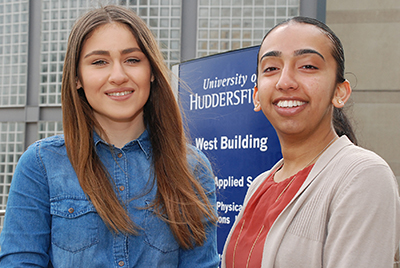 Anila Farooq and Mariana Dineva – Developing mathematical support
Anila Farooq and Mariana Dineva – Developing mathematical support
Anila Farooq (pictured right in the photo) and Mariana Dineva (pictured left in the photo) are currently in the placement year of their BSc degrees in nutrition and public health. They have collaborated on research into the problem of “maths anxiety” among science students who think – rightly or wrongly – that their numerical skills might be inadequate. The anxiety can have a number of physical manifestations. There is also a related condition of test anxiety, which could affect performance.
Levels of anxiety vary among the scientific disciplines, say Anila and Farooq. Chemistry students are the least prone. Levels are higher among students of subjects that have a less obviously mathematical content, such as nutrition.
As part of Anila and Mariana’s research, all new students in the University’s School of Applied Sciences completed a Mathematics Anxiety Scale questionnaire. They repeated it at the end of the academic year, so that the two students will be able to analyse the data and judge whether the levels of anxiety have declined. The findings will have relevance to development of mathematical support services offered by universities.
Both Anila and Mariana acknowledge that they felt a need to boost their maths skills at the start of their courses, but are much more confident now. At the RSC event, the presentation – delivered by Mariana – and the poster, prepared by the whole research team, concentrated on maths anxiety as experienced by chemistry students.
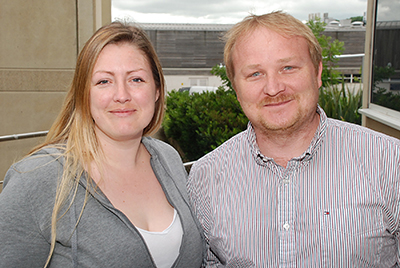 Stuart Wilson and Gemma Harling – Student participation outside the classroom
Stuart Wilson and Gemma Harling – Student participation outside the classroom
Stuart Wilson (pictured right) and Gemma Harling (pictured left), who are studying for MSci degrees in Pharmaceutical and Chemical Sciences at the University of Huddersfield, gave a presentation and displayed a poster dealing with a range of new teaching strategies that can be introduced as early as Key Stage Three (ages 11-14) and continued through to Higher Education level. The duo’s presentation was titled Unlocking Higher Education Potential: Unlocking the Pedagogic Seed in Key Stage 3.
For their placement year, Stuart and Gemma have had varied teaching experiences. He has been based at Spen Valley High School and she spent six months at a school in Andrah Pradesh in India. “It was amazing and I would love to go back,” said Gemma.
The two students have explored a wide range of teaching strategies, such as the “flipped classroom” approach. This involves students learning the content of a course outside the classroom, so that during lessons and lectures their time is more valuably spent developing a deeper understanding of the concepts behind the subject.
At the RSC event Gemma and Stuart argued that the focus needs to shift to student participation outside the classroom and that it is vital for students to gain the key skills that would unlock their Higher Education potential while still at school.







